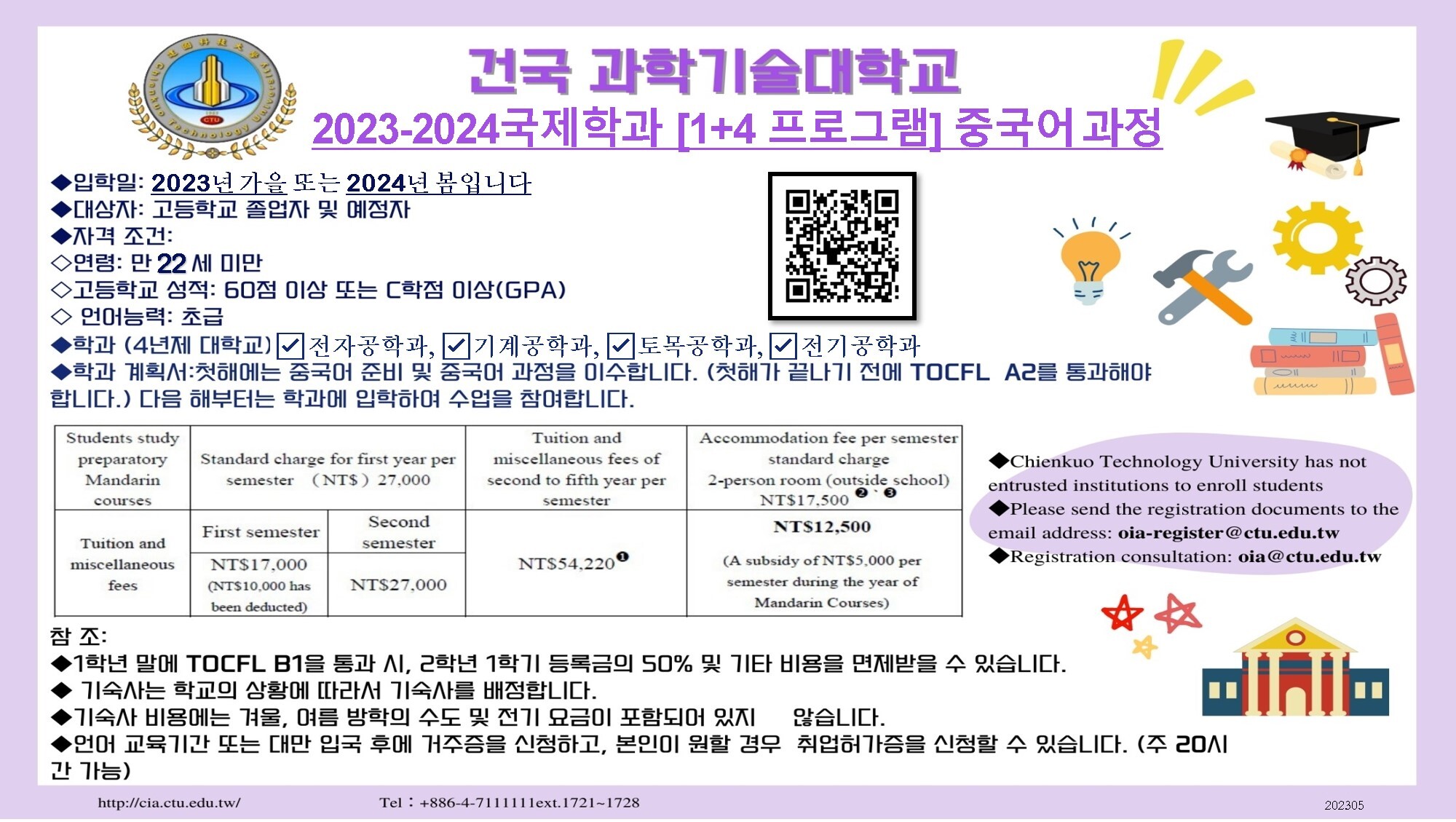2024-2025 IFP 招生資訊
2023-2024年國際專修部【1+4方案】華語課程先修
INTERNATIONAL FOUNDATION PROGRAM
| 中文 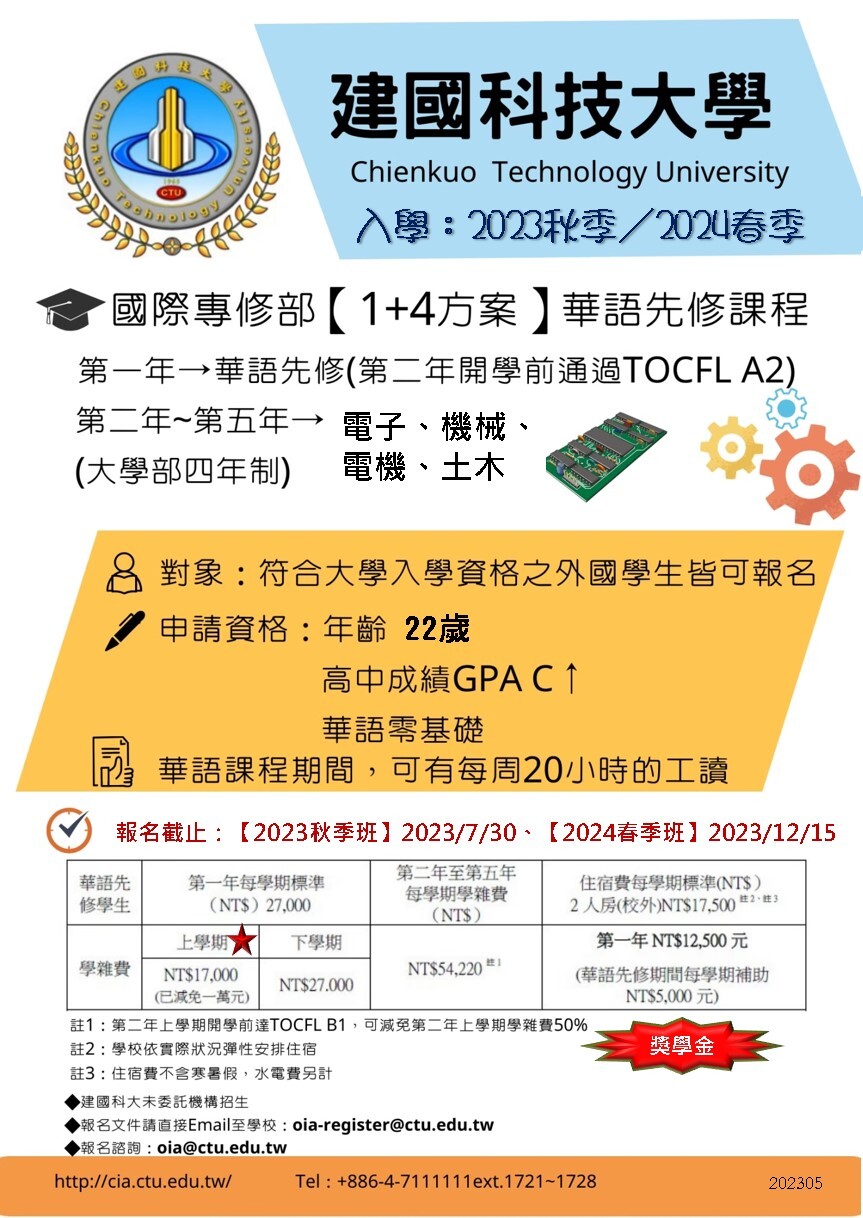 | 英文ENGLISH
| 英文ENGLISH 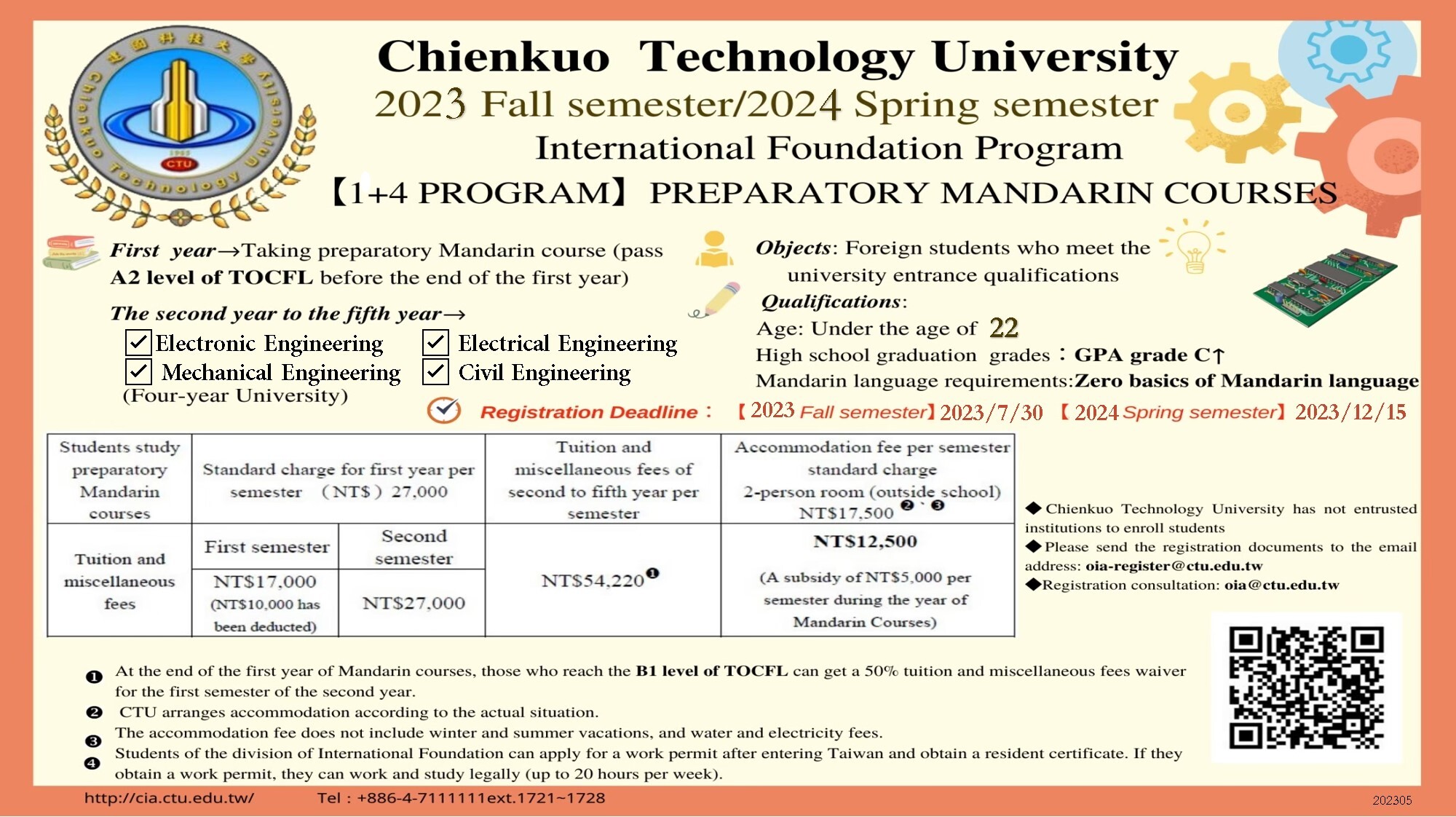 | 越南文Vietnamese
| 越南文Vietnamese 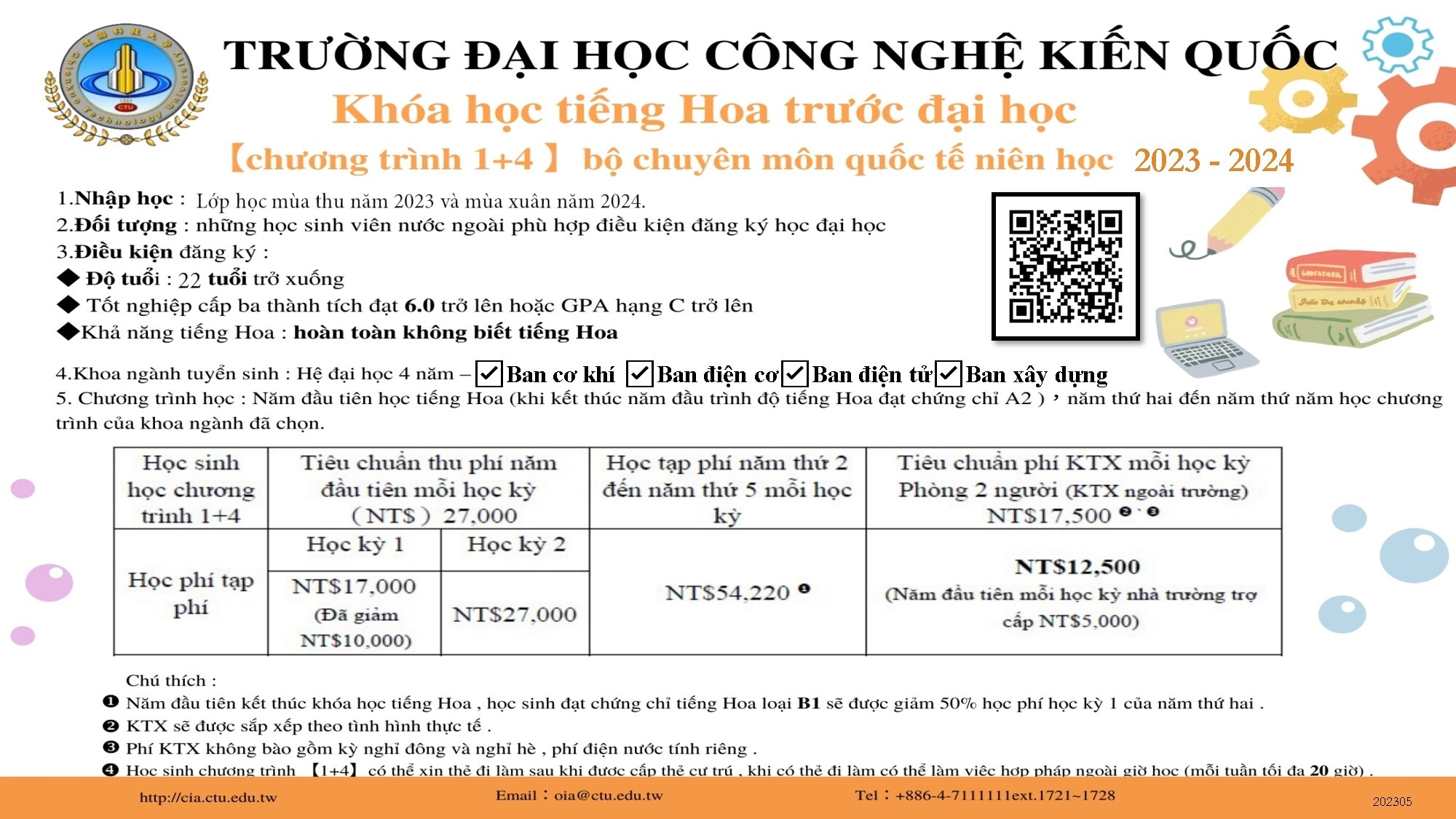 | 緬甸文Burmese
| 緬甸文Burmese 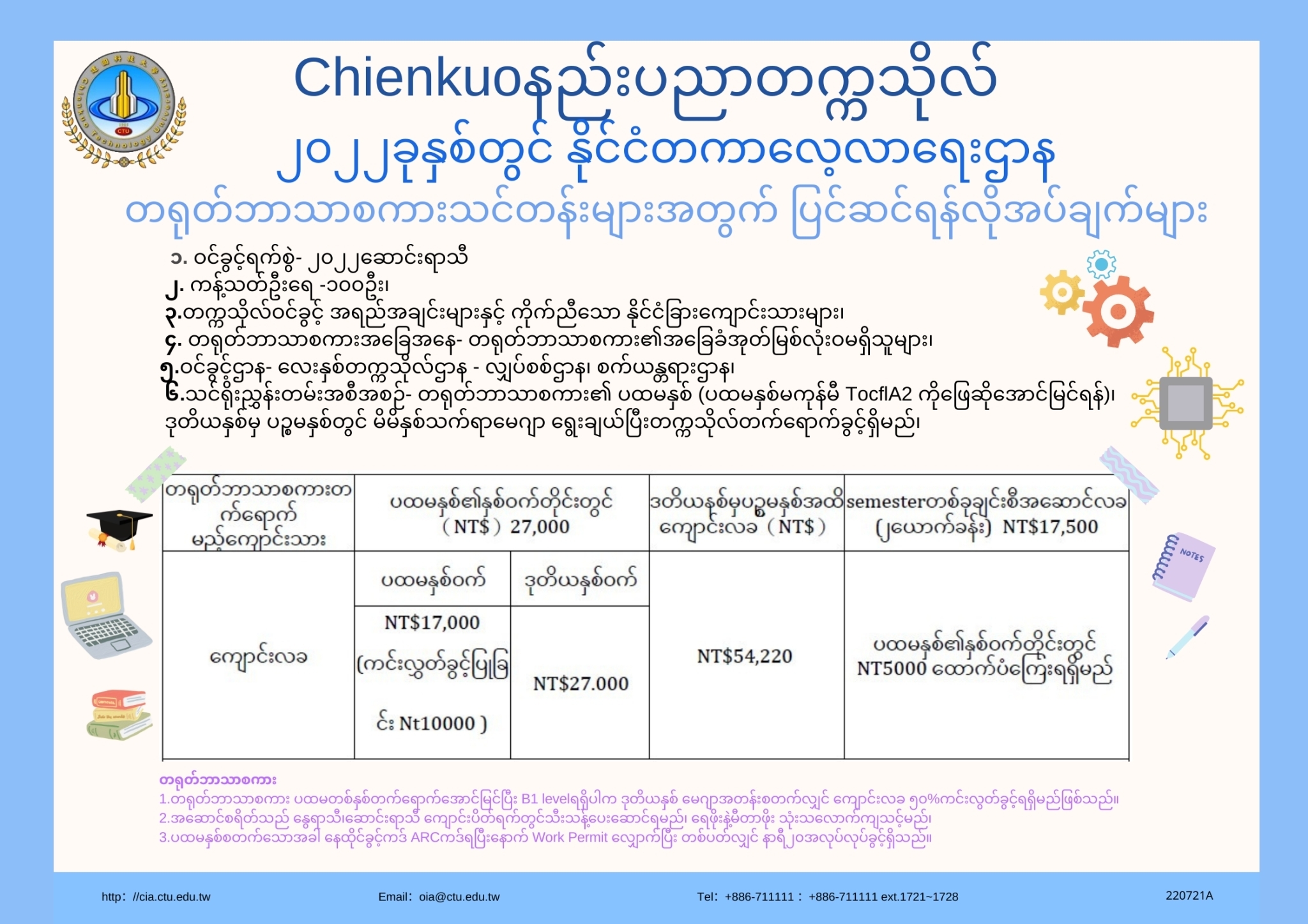 |
|
| 印尼文Indonesian ![]() | 蒙古Mongolian
| 蒙古Mongolian ![]() | 韓文Kroean
| 韓文Kroean 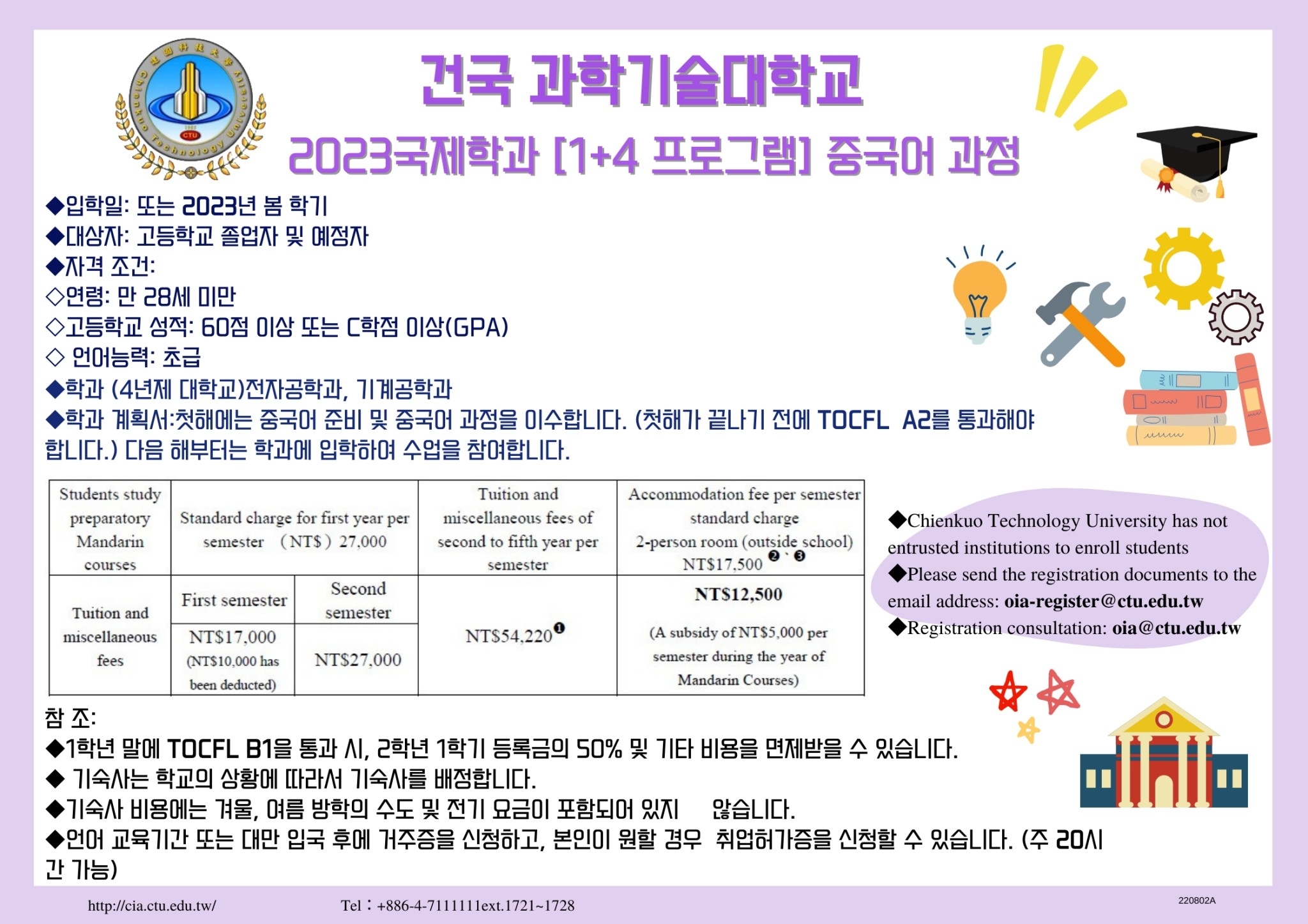 | 日文Japan |
| 日文Japan |
【招生資訊】國際專修部【1+4方案】華語課程先修(韓文Korean)
|
建國科技大學 건국 과학기술대학교 Chienkuo Technology University 國際專修部【1+4方案】華語課程先修 INTERNATIONAL FOUNDATION PROGRAM 학사와잇는징검다리 【1+4 프로그램】 중국어 과정
Admission Date: Fall Semester / Spring Semester 입학일: 2023년 가을 또는 2024년 봄입니다.
Objects: Foreign students who meet the university entrance qualifications 대상자: 고등학교 졸업자 및 예정자
Qualifications:
자격 조건:
Department of Admissions:
학과 (4년제 대학교)
☑전자공학과, ☑기계공학과, ☑토목공학과, ☑전기공학과, ☑관광 전공
Course Plan: Taking preparatory Mandarin courses in the first year (pass A2 before the end of the first year), the second year to the fifth year: enter the key industrial department. 학과 계획서: 첫해에는 중국어 준비 및 중국어 과정을 이수합니다. (첫해가 끝나기 전에 TOCFL A2를 통과해야 합니다.) 다음 해부터는 학과에 입학하여 수업을 참여합니다.
Tuition and miscellaneous fees:
備註: u第一年華語課程結束,華測成績未達A2者,依規定退學;達B1者,可獲得第二年上學期學雜費減免50% v學校依實際狀況安排宿舍 w住宿費用不含寒暑假、水電費另計 x華語先修部學生入境取得居留證後,可申請工作證,若取得工作證即可合法工讀(每週上限20小時)。 Note: u At the end of the first year of Mandarin courses, those who reach the B1 level of TOCFL can get a 50% tuition and miscellaneous fees waiver for the first semester of the second year. v CTU arranges accommodation according to the actual situation. w The accommodation fee does not include winter and summer vacations, and water and electricity fees. x Students of the division of International Foundation can apply for a work permit after entering Taiwan and obtain a resident certificate. If they obtain a work permit, they can work and study legally (up to 20 hours per week). 참 조: u 1학년 말에 TOCFL B1을 통과 시, 2학년 1학기 등록금의 50% 및 기타 비용을 면제받을 수 있습니다. v 기숙사는 학교의 상황에 따라서 기숙사를 배정합니다. w 기숙사 비용에는 겨울, 여름 방학의 수도 및 전기 요금이 포함되어 있지 않습니다. x 언어 교육기간 또는 대만 입국 후에 거주증을 신청하고, 본인이 원할 경우 취업허가증을 신청할 수 있습니다. (주 20시간 가능) 聯絡email: oia-register@ctu.edu.tw / TEL: +886-47116392 / +886-47111111ext.1724、1730
|
||||||||||||||||||||||||||||||||||||||||||||||||||||||||||||||||||||||||||||||||||||
 0應繳資料-CTU112國際專修部招生簡章.pdf
0應繳資料-CTU112國際專修部招生簡章.pdf attachment1-CTU112國際專修部學申請資料檢核表List of Application Required Materials
attachment1-CTU112國際專修部學申請資料檢核表List of Application Required Materials
- Bản kiểm soát hồ sơ đăng ký chương trình 1+4 hệ chuyên tu quốc tế của trường Đại học công nghệ Kiến Quốc attachment2-CTU112國際專修部入學申請表Application form for admission (含attachment3~attachment12)
attachment2-CTU112國際專修部入學申請表Application form for admission (含attachment3~attachment12)
- Đơn xin nhập học attachment3-CTU在台就學身份切結書Checklist and Declaration for International Applicants Undertaking Studies in Taiwan
attachment3-CTU在台就學身份切結書Checklist and Declaration for International Applicants Undertaking Studies in Taiwan
- Bản kiểm soát hồ sơ và bản cam kết attachment4-CTU身份資格具結書Admission Application Affidavit
attachment4-CTU身份資格具結書Admission Application Affidavit
- Đơn cam kết thân phận attachment5-CTU文件驗證切結書Affidavit (of admissions documents to be verified
attachment5-CTU文件驗證切結書Affidavit (of admissions documents to be verified
- Đơn cam kết giấy tờ attachment6-CTU留學讀書計畫Study plan / Statement of Purpose
attachment6-CTU留學讀書計畫Study plan / Statement of Purpose
- Đơn kế hoạch học tập attachment7-CTU個人資料蒐集同意書Personal Data Collection Agreement
attachment7-CTU個人資料蒐集同意書Personal Data Collection Agreement
- Đơn đồng ý thụ quyền kiểm chứng dữ liệu cá nhân (Authorization) attachment8-CTU申請入學推薦信The Letters of Recommendation
attachment8-CTU申請入學推薦信The Letters of Recommendation
- Thư giới thiệu -2 bản ( 1 bản của giáo viên tiếng Hoa) attachment9-CTU資助者財力證明保證書 proof of financial ability
attachment9-CTU資助者財力證明保證書 proof of financial ability
- Chứng minh tài chính attachment10-CTU入學獎學金申請表.pdf
attachment10-CTU入學獎學金申請表.pdf attachment11-CTU新生住宿申請表.pdf
attachment11-CTU新生住宿申請表.pdf
|
系所簡介 Department Introduction 학과 소개
Department features: This department is characterized by the development of three major fields of information communication, microcomputer application, optoelectronics and semiconductors, which fully conforms to the development of the four major industries of the Central Taiwan Science Park: communications, computers and peripheral equipment, optoelectronics and integrated circuit industries. Through industry-academia cooperation, students can accumulate practical experience, connect with the industry in advance, and cultivate electronic professionals and technical personnel. 전자공학과 특징: 이 학과는 정보통신, 마이크로컴퓨터 응용, 광전자공학 및 반도체의 3개 주요 분야의 발전을 특징으로 하며 대만 과학 단지의 4대 주요 산업인 통신, 컴퓨터, 광전자공학 그리고 반도체의 발전에 부합을 합니다. 산학협력을 통해 학생들은 실무 경험을 축적하고 업계와 사전에 협력하며 전자 전문 기술 인력을 양성하는 학과입니다.
2.1培養實務與理論兼備的優秀電子工程專業人才: Cultivating outstanding electronic engineering professionals with both practice and theory: 실무와 이론을 겸비한 우수한 전자공학 전문가를 양성합니다.
Cultivate practical knowledge of electronic engineering. 전자공학 실무지식을 배양합니다.
Cultivate the ability of basic mathematics and application. 기초 수학 및 응용 능력을 배양합니다. 2.2奠定厚實之電子專業技術能力: Lay a solid electronic professional technical ability: 전문 전자 기술 능력자를 만들다.
Cultivate professional skills in various electronic equipment or systems. 다양한 전자 장비 또는 시스템에 대한 전문적인 기술을 배양합니다.
Execute tasks related to electronic design, manufacture, operation, and maintenance. 전자 설계, 제조, 적용 및 유지 보수와 관련된 업무를 수행합니다.
To enable students to meet the manpower needs of domestic applied electronics and IT-related industries. 학생들이 국내 전자 및 IT 관련 산업의 인력 수요를 충족시킬 수 있도록 합니다. 2.3訓練學生實務專題創作及溝通與協調能力 To train students in practical project creation and communication and coordination skills 학생들에게 실용적인 프로젝트를 창조하면 커뮤니케이션 및 협력 기술을 교육합니다.
Cultivate the ability of individual or collective creation of practical topics. 실용적인 주제에 대해 개인 또는 공동 사업의 능력을 개발합니다.
Develop leadership, team communication and coordination skills. 리더십, 팀 커뮤니케이션 그리고 서로 협력할 수 있는 기술을 개발합니다. 2.4培養學生具備專業倫理、關懷社會之道德精神 Cultivate students with professional ethics and the moral spirit of caring for the society 직업윤리와 사회를 배려하는 도덕적 정신을 지닌 학생을 양성합니다.
Develop a professional and responsible work ethic. 전문적이고 책임감 있는 학생을 만듭니다.
Truth-seeking, law-abiding work attitude. 진리를 추구하면 준법적인 업무 태도자를 양성합니다.
Mutual assistance, lasting professionalism. 상호 협력하면 지속적인 전문성을 개발할 수 있게 합니다.
The spirit and enthusiasm for helping others and caring for society. 남을 돕고 사회를 보살피는 정신과 열정 가진 학생으로 양성합니다.
학과 특징과 교육목표
Courses include basic courses, mechanical engineering majors, and general courses, with a minimum graduation credit of 128 credits. 과정은 기초과정이면 기계공학과 일반과정으로 구성되며 최소 졸업학점은 128 학점을 이수해야 합니다.
The course planning is mainly based on practical application, and the courses are divided into course modules such as precision machinery and computer-aided design, manufacturing, analysis, and automated production and manufacturing. 교육과정은 실용적인 응용 프로그램을 기반으로 하고 정밀 기계, 컴퓨터 지원 설계, 제조, 분석 그리고 자동화 제조 같은 프로그램으로 합니다.
The course is combined with professional license guidance and guides students to obtain CNC milling machine grade B, computer-aided three-dimensional drawing, computer-aided mechanical drawing, SolidWorks international certification, AutoCAD international certification, and mold flow analysis international certification, etc. 이 과정은 전문 자격증을 취득하도록 도와줍니다. (CNC milling machine grade B, computer-aided three-dimensional drawing, computer-aided mechanical drawing, SolidWorks international certification, AutoCAD international certification, and mold flow analysis international certification, etc.)
Cultivate the mechanical professional and technical personnel of "the integration of theory and practice", with a pragmatic attitude, with a complete program planning and rich and lively teaching methods, with emphasis on the development of practical and innovative capabilities, to cultivate students with mechanical engineering and other related engineering talents with specialized knowledge. "이론과 실천의 통합"의 기계 전문가 및 기술 인력을 양성하고 실용적인 프로그램을 계획하면 많은 교육을 통하여, 실용적이고 혁신적인 능력의 개발을 강조하고 기계 공학을 가진 전문 인재를 양성합니다.
According to the needs of the machinery industry and the development trend of the machinery industry, students are trained to have practical professional technical talents in precision machinery and intelligent manufacturing and other related fields and can apply computer-aided engineering for design, analysis, and manufacturing. 기계산업의 요구와 기계 산업의 발전 추세에 따라 정밀 기계, 지능형 기계 및 기타 관련 분야의 실용적인 전문 기술 인재를 양성하고 설계, 분석 및 제조에 컴퓨터를 활용하면 응용하는 공학입니다.
Department features: Make great efforts to point out the advantages and disadvantages of the school's teaching, department of automation engineering has changed the traditional teaching methods are based on imparting established professional knowledge, and instead, focus on professional logical thinking and reverse inference, teaching students to treat science with a skeptical sight, facing problems with an attitude of challenging authority, closely follow the trend of science and technology, and cultivate the ability to think and judge independently. Our department has already achieved its expected goals in the recruitment of professional talents. In addition, the department has planned four major courses of robotics and intelligent control, optoelectronics and communication technology, nanotechnology and materials, and technology management for graduate students of the institute and related persons to choose. It is suitable for developing in-depth academics, exploring the wide application of related technologies in domestic industries, and achieving the goal of placing equal emphasis on theory and practice. 학과 특징: 학교 교육의 장단점을 파악하기 위하여 많은 노력을 기울이고, 전문 지식과 전문적인이고 논리적 사고 그리고 역 추론에 중점을 두고 학생들에게 도전하는 태도로 문제에 직면하였을 때, 과학 기술의 자주적, 독립적으로 사고와 판단하는 능력을 가르칩니다. 본 학과는 이미 전문 인재 채용에서 예상 목표를 달성했으며, 또한 본 학과에서는 대학원생을 대상으로 로봇공학, 지능제어, 광전자 및 통신 기술, 나노기술 및 재료, 그리고 기술경영의 4개 전공과목을 대학원생 및 관련자가 선택할 수 있도록 준비되어 있습니다. 학문을 육성하고 관련 기술을 국내 산업에 광범위하게 적용하며 이론과 실습을 동등하게 중시하고 목표를 달성하는 데 적합하도록 준비되어 있습니다.
Cultivating "electronic control design" talents: The goal is to cultivate the talents of electronic control design engineers. "전자제어 설계" 인재 양성 : 목표는 전자제어 설계 엔지니어의 인재 양성을 목표로 한다.
Cultivating "Automation mechanism design" talents: The goal is to cultivate the talents of automation mechanism design engineers. "자동화 메커니즘 설계" 인재 양성: 목표는 자동화 기계 설계 엔지니어의 인재를 양성하는 것으로 한다.
Cultivating "mechatronics integration" talents: The goal is to cultivate talents of mechatronics engineers. "메카트로닉스 통합" 인재 육성: 목표는 전자 기계 통합 엔지니어의 재능을 양성하는 것으로 한다.
"생산 시스템 엔지니어" 인재 양성 : 생산 시스템 엔지니어 인재를 양성하는 목표로 한다.
“디자인 시스템 매니저” 인재 양성: 디자인 시스템 매니저를 양성하는 것을 목표로 한다.
"테스트 시스템 관리자" 인재 육성: 목표는 테스트 시스템 관리자를 양성하는 것을 목표로 한다.
Cultivating talents with "six abilities" - able to do, think, learn, socialize, live, and work: the goal is to cultivate high-quality innovative technical talents. ”6가지 능력”의 인재 양성 - 가능하고, 생각하고, 배우고, 사회화하고, 생활하고, 일할 수 있습니다. 목표는 혁신적인 기술 인재를 양성하는 것을 목표로 한다.
Department features: The development of this department aims to cultivate high-level technical R&D personnel in electrical engineering with both practice and theory and perform tasks related to design, production, construction, operation and maintenance, in order to assist the continuous upgrading of domestic industries. Strengthen the promotion of the characteristics of "green energy power technology", "semiconductor process technology and machine maintenance training", "embedded system maintenance integration", and develop teaching materials for the education and training of teachers and students in the whole school with the advent of the information age, and achieve the purpose of resource sharing. 학과 특징: 본 학과의 목적은 국내 산업의 지속적인 고도화를 지원하기 위해 전기 공학 분야의 실무와 이론을 겸비한 기술 R&D 인력을 양성하고 설계, 생산, 건설, 운영 및 유지 보수와 관련된 업무를 수행하는 것을 목표로 합니다. "녹색 에너지 전력기술", "반도체 공정기술 및 기계 유지 보수 훈련", "내장 시스템 유지 보수"의 추진을 강화하고, 본 교는 전체 교수와 학생의 교육훈련을 위한 교재를 개발하며, 정보화 시대의 자원 공유의 목적을 달성하기 위한 노력합니다.
Instructional Objectives: Cultivate electrical machinery professionals with creativity, innovation, and entrepreneurship. The goals include basic knowledge and ability, practical creation and innovation, professional attitude and quality, engineering ethics, and responsibility. 교육 목표: 창의성, 혁신 및 기업가 정신을 갖춘 전기 기계 전문가를 양성한다. 목표는 기본 지식과 능력 그리고 실질적인 창조와 혁신, 전문적인 태도와 품질, 공학 윤리 및 사회적 책임을 포함합니다. 2.1基礎知識與能力Basic knowledge and ability기본 지식과 능력
To teach engineering fundamentals and application necessary knowledge 공학의 기초와 응용에 필요한 지식을 가르친다.
Build the ability to apply analytics to solve problems 문제를 해결하기 위해 분석 능력을 구축한다.
창의와 혁신을 실행한다.
Cultivate the ability of independent study creation and implementation 독립적인 연구를 실행하고 능력을 배양한다.
The ability to make good use of Internet resources 인터넷 자원을 잘 활용하는 능력을 키운다. 2.3專業態度與素養Professional attitude and literacy 전문적인 태도와 지식 보유
Develop teamwork and communication skills 팀워크와 커뮤니케이션 기술 개발한다.
Develop interpersonal and crisis management skills 대인관계 발전 및 위기관리 기술 개발을 한다. 2.4工程倫理與責任Engineering ethics and responsibilities 엔지니어링 윤리 및 책임
Value professional ethics and intellectual property rights 직업윤리와 지적재산권을 중시한다.
Responsibilities of engineers to society 사회에 대한 엔지니어의 책임을 갖는다. |
